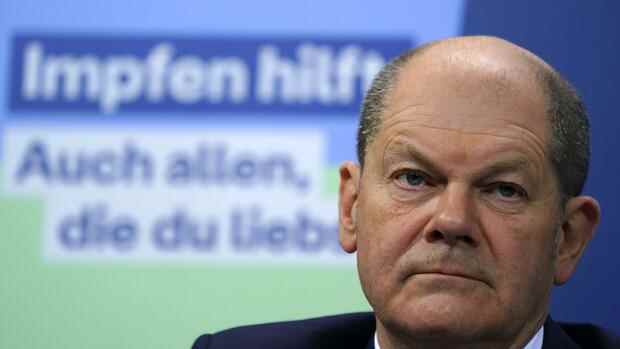After the conference with the country heads, the Chancellor informed about the decisions.
(Photo: Getty Images)
Berlin In view of the sharp increase in the number of corona infections, the leaders of the federal and state governments discussed how to proceed in the pandemic this Monday. The result: no tightening of the previous measures for the time being, but no easing either – Chancellor Olaf Scholz (SPD) and the Prime Ministers want to stick to their previous course.
The strict contact restrictions are “necessary,” said Chancellor Scholz on Monday evening. In view of the high number of infections, caution is still required. The further course of the pandemic is still uncertain. “Now it’s time to stay on course,” said Scholz. Practical measures – such as prioritizing the PCR tests – should make it easier to deal with the high number of infections. In addition, the federal government is examining whether to continue short-time work benefits and economic aid.
The most important points of the resolution at a glance:
- federal and state governments opening perspectives develop for the moment “at which an overload of the health system can be ruled out”.
- From further measures is the talk. “If the healthcare system is about to be overwhelmed, they will further infection control measures agree,” it says.
- With a view to potentially serious economic consequences Companies are now also benefiting from Corona economic aid from the state beyond March to adjust. So far, drafts have only mentioned an examination.
- The limited ones PCR tests should be focused on vulnerable groups and employees who look after and treat them, “i.e. on the staff in particular in hospitals, in practices, in care, integration aid facilities and for people at risk of serious illnesses,” it says.
- In addition, they should test capacities be expanded.
- for employees in the medical field should in the future general quarantine rules be valid. Accordingly, they no longer have to submit a PCR test to free themselves from quarantine after seven days. A quick test should suffice in the future.
- There were also violent ones criticism of quick decision to shorten the recovered status from six to three months. In future, stipulations on this should be announced and justified in good time before they come into force due to their considerable scope.
- A topic was also the digitalization. The Expert Council had criticized this in its statement. The Conference of Health Ministers should be asked to submit a report on the implementation of the Public Health Service Pact as well as about the Introduction of the German Electronic Reporting and Information System (DEMIS) to be presented in the hospitals.
- In the short term, according to the decision, the digital applications to prove the vaccination or recovery status, especially the CovPass and the Corona warning app, to be further developed. This should make it easier to check the 2G or 2G-plus proof.
- However, a “systematic data collection for vaccination and therapy for Covid-19 at the individual level” can no longer be found. This could have been understood as a vaccination register.
North Rhine-Westphalia’s Prime Minister Hendrik Wüst (CDU) even called for a concrete path back to normal to be mapped out. An exit strategy must be prepared for the time when it is certain that the healthcare system will not be overloaded by Omikron and the critical infrastructure will remain stable, he said.
Top jobs of the day
Find the best jobs now and
be notified by email.
Business associations welcomed this step. “It is clear for retailers that the 2G restrictions that still apply to many retailers can and must be lifted today,” said the head of the HDE trade association, Stefan Genth, to the Handelsblatt. “Shopping with a mask, distance and hygiene concept is safe.”
This has been shown by experience in the food trade and scientific studies. “Politicians must therefore take this step immediately.” On the other hand, when it is time to let the mask requirement when shopping expire, the virologists and doctors would certainly have to decide. “It’s still too early for that,” said Genth.
In addition, the Federal Ministry of Health defended the PCR prioritization against criticism that it had not provided sufficient capacity. In an international comparison, Germany has very good laboratory equipment, and test capacities are constantly being expanded. “But with the number of cases to be expected, it will of course be the case that the resources are finite,” said a spokesman. The details are then to be set out in a regulation “promptly” after the federal-state meeting.
Employer President Rainer Dulger generally called for more plannability and implementable specifications for companies and employees. PCR prioritization means nothing other than that many will soon no longer have access to it, he said. This does not contribute to the feeling of security of the population.
“Changing the requirements for access to the workplace overnight is the opposite of planning and feasibility,” he said, also with a view to reducing the recovered status from six to three months. That’s why there was heavy criticism of Minister Karl Lauterbach (SPD) during the federal-state summit. The decision unsettled many people, said Prime Minister Wüst after the summit. “A predictive pandemic also includes reliability.”
According to the Robert Koch Institute (RKI), the seven-day incidence rose to the next high of 840.3. The health authorities reported 63,393 new cases in one day. 73.4 percent of people are considered fully vaccinated, 50.4 percent have received a booster shot.
More: Does he lose his good reputation? The seven problems of Karl Lauterbach.
